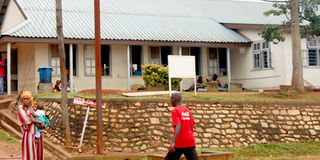250 die as Mulago runs out of cancer drugs

WITHOUT DRUGS: Uganda Cancer Institute. PHOTO BY : ISAAC KASAMANI
The shortage of life saving drugs, used in the treatment of cancer, has resulted into the deaths of 250 children at Mulago Hospital. The Uganda Cancer Institute at the National Referral Hospital has for the last three months been operating without essential drugs.
“There are no cancer drugs now at the Cancer Institute of Mulago because we have not received any delivery from National Medical Stores and patients are forced to buy for themselves,” said Dr Jackson Oryem, the director of the Cancer Institute, adding, “We cannot do our work effectively.”
Some of the critical cancer drugs that have run out include Cyclophosphamide, Adriamycin and Methotrexete, all chemotherapy drugs. Many cancer patients have been forced to purchase prescribed drugs from private clinics at a market rate, considered too expensive for an average Ugandan.
A dose of treatment that costs Shs93,000 at government rate goes for as high as Shs450,000 at the private clinics. The situation at the Institute is a desperate one; with some reports indicating that close to 250 children are known to have died from the disease this year alone, most of them within the last four months.
“I don’t know where the statistics of 250 deaths of children last year came from but what I can say is that the number of deaths is alarming,” Dr Oryem said.
Old people dying
“And it is not only children dying; even the elders die because they cannot afford drugs. Some of them die from home after leaving the Institute and we cannot really establish the exact numbers of deaths,” he added. So grave is the situation that for Ms Jane Nakamate, a single parent from Luwero District, the constant thought of her son’s imminent death is unavoidable.
Ms Nakamate is nursing her 13-year-old son Joseph Kintu, who is suffering from acute Leukemia but without drugs to reverse his pain, all her hopes are slowly fading.
Kintu was admitted to the hospital three weeks ago. His mother paid Shs510,000 for the first dose of drugs within the first three weeks. Those drugs got finished last week.
Effective next week, Kintu is supposed to start on a 10-day round of treatment, but he will not because his mother cannot afford to pay the Shs4.5 million treatment fee at a cost of Shs450,000 per day.
Central to the cause of shortages is the National Medical Stores, which is being blamed for delaying the procurement. The National Medical Stores last supplied the Institute with drugs on May 25 this year. The National Medical Stores has instead shifted blame to the Public Procurement and Disposal of Public assets – PPDA.
But Mr Edgar Agaba, the executive director of PPDA, placed blame on NMS for their inefficiency and lack of planning. In a phone interview on Friday, Mr Agaba said the lack of cancer drugs had not been brought to his attention at all.
He explained that NMS ignored his advice to plan and purchase the recommended cancer drugs on quarterly basis. “This financial year we received Shs1.5 billion for purchase of cancer drugs from the national budget but up to now we have not received the drugs. It is up to the National Medical Stores to deliver the drugs to us because we believe they got the money from government,”
Dr Oryem said adding that cancer is treated with 28 different kinds of drugs. Current reports indicate an increase in cases of the disease in Uganda.
Last year, the Institute treated 12,000 patients, a figure which is set to increase by over 3,000 this year.
According to the 2010/2011 national budget, the Institute will need about Shs1.5 billion to treat close to 15,000 patients. This budget figure increased from Shs800 million used in the last financial year.
According to Dr Orem, the increased infection rate in Uganda can be explained by changes in environment and lifestyles such as smoking and drinking, age and increased population.
The Minister of State in-charge of Primary Health Care James Kakooza said that government is in advanced stages to amend the procurement rules to allow some cases of emergency purchases for certain life saving drugs to be fast tracked without necessarily resorting to the rigid general guidelines.




